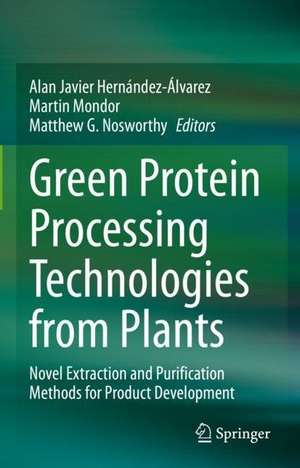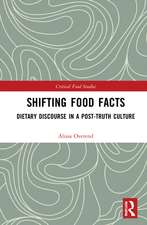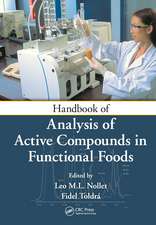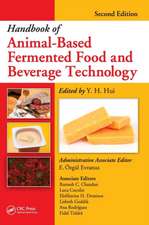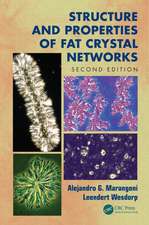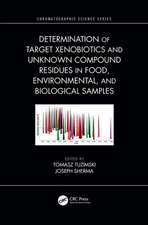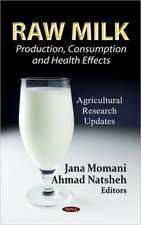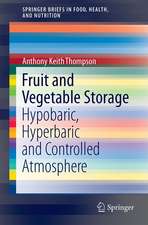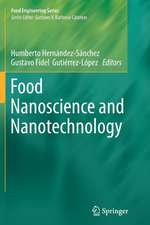Green Protein Processing Technologies from Plants: Novel Extraction and Purification Methods for Product Development
Editat de Alan Javier Hernández-Álvarez, Martin Mondor, Matthew G. Nosworthyen Limba Engleză Hardback – 2 ian 2023
The book opens with an introduction to the most conventional processing technologies used in industry today: the alkaline extraction followed by isoelectric precipitation, and air classification. The book also focusses on novel extraction and purification technologies, covering the most recent green emerging technologies based on enzymatic processes, solvents, high-pressure processing, barometric membrane technologies, and microwave-assisted extraction, among others. The final chapters bridge the gap between the presented methods and product development and highlight how these technologies can alter protein functionality and nutritional quality of the extracted protein, and thereby, impact human health.
In the context of rising consumer interest in foods from plant-protein ingredients and the United Nations targets for Sustainable Development Goal 12 on ‘Responsible Consumption and Production’, this book will provide an indispensable resource for students, engineers and researchers in academia and industry, working in the area of food science, food technology and plant-based product development.
| Toate formatele și edițiile | Preț | Express |
|---|---|---|
| Paperback (1) | 1111.53 lei 6-8 săpt. | |
| Springer International Publishing – 3 ian 2024 | 1111.53 lei 6-8 săpt. | |
| Hardback (1) | 1118.51 lei 6-8 săpt. | |
| Springer International Publishing – 2 ian 2023 | 1118.51 lei 6-8 săpt. |
Preț: 1118.51 lei
Preț vechi: 1364.04 lei
-18% Nou
Puncte Express: 1678
Preț estimativ în valută:
214.02€ • 223.48$ • 176.73£
214.02€ • 223.48$ • 176.73£
Carte tipărită la comandă
Livrare economică 15-29 aprilie
Preluare comenzi: 021 569.72.76
Specificații
ISBN-13: 9783031169670
ISBN-10: 3031169670
Pagini: 354
Ilustrații: XV, 354 p. 1 illus.
Dimensiuni: 155 x 235 mm
Greutate: 0.72 kg
Ediția:1st ed. 2023
Editura: Springer International Publishing
Colecția Springer
Locul publicării:Cham, Switzerland
ISBN-10: 3031169670
Pagini: 354
Ilustrații: XV, 354 p. 1 illus.
Dimensiuni: 155 x 235 mm
Greutate: 0.72 kg
Ediția:1st ed. 2023
Editura: Springer International Publishing
Colecția Springer
Locul publicării:Cham, Switzerland
Cuprins
Contents
Alkaline Extraction–Isoelectric Precipitation
Irma Cruz-Solis, Celeste C. Ibarra-Herrera, María del Refugio Rocha-Pizaña and Diego Luna-Vital
Air Classification
Solmaz Tabtabaei, Botagoz Kuspangaliyeva, Raymond L. Legge and Amin Reza Rajabzadeh
Barometric Membrane Technologies
Alfredo Cassano and Carmela ConidiElectro-activation as Emerging Technology for Proteins Extraction from Plant-Materials: Theory and Applications
Mohammed Aider
Emerging solvent extraction technologies for plant protein extraction
Aqueous two-phase extraction; Deep eutectic solvent; Subcritical water extraction
Martin Mondor and Alan Javier Hernández-Álvarez
Enzyme-assisted extraction
Thanyaporn Kleekayai, Mohammadreza Khalesi, Miryam Amigo-Benavent, Maria Cermeño, Pádraigín Harnedy-Rothwell and Richard J. FitzGerald
High pressure
Alice Marciniaka and Alain DoyenHigh Voltage Electrical Treatments as an Eco-efficient Approach for Plant Proteins Processing
Sergey Mikhaylin
Microwave-assisted extraction of plant proteins
Elena Peñas, Blanca Hernandez-Ledesma Cristina Martinez-Villaluenga
Micellar precipitation and reverse micelle extraction
Oscar Abel Sánchez-Velázquez, María Lilibeth Manzanilla-Valdez, Yan Wang, Martin Mondor and Alan Javier Hernández-Álvarez
Application of ultrasound technology in plant-based proteins: Improving extraction, physicochemical, functional and nutritional properties
Xiaohong Sun, Raliat O. Abioye, Caleb Acquah, Chibuike C. UdenigweImpact of green extraction technologies on plant protein content and quality
Matthew G. Nosworthy and Christopher P.F. Marinangeli
Effects of extraction technologies on the functionalities and applications of plant proteins
Jingqi Yang, Sitian Zhang, Yifu Chu and Lingyun Chen
Alkaline Extraction–Isoelectric Precipitation
Irma Cruz-Solis, Celeste C. Ibarra-Herrera, María del Refugio Rocha-Pizaña and Diego Luna-Vital
Air Classification
Solmaz Tabtabaei, Botagoz Kuspangaliyeva, Raymond L. Legge and Amin Reza Rajabzadeh
Barometric Membrane Technologies
Alfredo Cassano and Carmela ConidiElectro-activation as Emerging Technology for Proteins Extraction from Plant-Materials: Theory and Applications
Mohammed Aider
Emerging solvent extraction technologies for plant protein extraction
Aqueous two-phase extraction; Deep eutectic solvent; Subcritical water extraction
Martin Mondor and Alan Javier Hernández-Álvarez
Enzyme-assisted extraction
Thanyaporn Kleekayai, Mohammadreza Khalesi, Miryam Amigo-Benavent, Maria Cermeño, Pádraigín Harnedy-Rothwell and Richard J. FitzGerald
High pressure
Alice Marciniaka and Alain DoyenHigh Voltage Electrical Treatments as an Eco-efficient Approach for Plant Proteins Processing
Sergey Mikhaylin
Microwave-assisted extraction of plant proteins
Elena Peñas, Blanca Hernandez-Ledesma Cristina Martinez-Villaluenga
Micellar precipitation and reverse micelle extraction
Oscar Abel Sánchez-Velázquez, María Lilibeth Manzanilla-Valdez, Yan Wang, Martin Mondor and Alan Javier Hernández-Álvarez
Application of ultrasound technology in plant-based proteins: Improving extraction, physicochemical, functional and nutritional properties
Xiaohong Sun, Raliat O. Abioye, Caleb Acquah, Chibuike C. UdenigweImpact of green extraction technologies on plant protein content and quality
Matthew G. Nosworthy and Christopher P.F. Marinangeli
Effects of extraction technologies on the functionalities and applications of plant proteins
Jingqi Yang, Sitian Zhang, Yifu Chu and Lingyun Chen
Notă biografică
Dr Alan Javier Hernández Álvarez is a biochemical engineer by training, with a PhD in Food Science and Nutrition (2012, National Polytechnic Institute, IPN) - Fat Institute, CSIC, Seville, Spain. He worked as a Lecturer at the Food Biochemistry Faculty, Biochemical Engineering Department at the National Polytechnic Institute, Mexico from 2012-2013. Awarded a postdoctoral fellowship from CONACyT in 2013 to follow his research at Agriculture and Agri-Food Canada, Saint-Hyacinthe, Quebec, Canada. After this, he was awarded a Visiting Fellowships in Canadian Government Laboratories Award, NSERC, Canada, 2014-2017. During his time at Agriculture and Agri-Food Canada, he worked with a wide variety of research projects in the areas of value-added food processing, and food quality, acting in an advisory and research capacity providing expertise on protein quality assessment, protein extraction and characterization, techno-functional properties assessment and bioactivity of proteins/peptides. He has collaborated with different Canadian/UK Industry Companies in a wide variety of industry-based projects such as Nature Zen, InnoVactiv, SEMICAN, THIS, Meatless Farm, among others. Currently a Lecturer in Nutrition and Global Health at the School of Food Science and Nutrition, University of Leeds since 2019. Member of the Global Food and Environment Institute (GFEI), University of Leeds. The aim of his research is to enable healthy sustainable diets through identifying and characterizing functional properties of food components, notably proteins and phytochemicals from a wide variety of indigenous and cultivated food sources such as pulses, cereals, pseudo-cereals, algae, insects, etc. A key area is understanding the role of processing on the biological value and safety of proteins and peptides. The long-range goal of Dr. Hernández-Álvarez’s research program is to enhance the health of individuals by identifying and determining the benefits of plant foods bioactive components. His research on legumes, algae, oilseeds, cereals and insects have led to increased understanding of the antioxidant, antihypertensive, anti-inflammatory, and other physiological properties of these foods. To date he has contributed to over 60 publications, book chapters, and conference abstracts in the research areas of protein extraction, bioactive peptides and food processing.
Martin Mondor, PhD Chemical Engineering. Martin Mondor is a chemical engineer by training. He received his bachelor’s degree (cooperative program) from the Université de Sherbrooke in 1995. He received a doctorate from the Université de Sherbrooke in 2000. In June 2004, he completed a three-year post-doctorate at Agriculture and Agri-Food Canada’s St-Hyacinthe Research and Development Centre (SHRDC) in St-Hyacinthe. He has been a research scientist at the SHRDC since February 2005, and specializes in membrane technology applications in the agri-food industry. Dr. Mondor's work aims to strengthen the sector's competitive position by focusing on value-added production and processing. He collaborated with different Canadian Industry Companies such as Ferme du Petit Chenal, InnoVactiv, Lassonde Industries, among others. Dr. Mondor has authored or co-authored more than 200 scientific contributions in the form of book chapters, scientific articles, research reports and presentations for scientific conferences. He is external reviewer for over 20 scientific journals. In 2015, Dr. Mondor received the International Association for Engineering and Food’s (IAEF) Distinguished Service Award for his outstanding contribution to the International Conference of Engineering and Food (ICEF) and IAEF activities which included the organization of the ICEF 12 conference held in Quebec City in June 2015. In 2021, Dr. Mondor was part of the team which received the Prize for Outstanding Achievement in Science from the Science and Technology Branch of Agriculture and Agri-Food Canada for their work on Novel technologies for delivery of antibiotic alternatives in livestock production. He was also part of the team on the Climate Change Roadmap that received the Deputy Minister Commendation Award in 2022.
Dr. Matthew Nosworthy received his Ph.D in amino acid metabolism from the Department of Biochemistry at Memorial University of Newfoundland in 2015 where he studied di-/tri-peptide transport in the yucatan minature piglet during growth and in states of disease. His three-year post-doctoral fellowship at the University of Manitoba from 2015-2018 investigated the effect of processing methods on in vivo and in vitro measures of plant protein quality. Dr. Nosworthy then accepted a research associate position in the College of Pharmacy and Nutrition at the University of Saskatchewan where he examined the relationship between genetic background and nutritional composition of pulse crops, how soil quality in Ethiopia alters crop nutrient content, as well as shelf-life and nutritional composition of extruded plant-based snacks. In April 2020, he accepted a Research Scientist position at the Guelph Research and Development Centre, Agriculture and Agri-food Canada, where is currently investigating plant-based protein nutrition and metabolism. Dr. Nosworthy’s research interests are centred on protein nutrition as related to novel protein sources. This includes the determination of amino acid composition and protein digestibility (protein nutritional quality), investigation of the bioavailability of amino acids/peptides using in vivo and in vitro techniques, as well as the identification of bioactive properties present in proteins post-digestion and how they can benefit human health. He has worked on diverse plant crops including soy, pulses, canola, cereals, and hemp at various stages of the food supply chain. To date he has contributed to over 65 publications, book chapters, and conference abstracts in the research areas of amino acid biochemistry and protein nutrition.
Martin Mondor, PhD Chemical Engineering. Martin Mondor is a chemical engineer by training. He received his bachelor’s degree (cooperative program) from the Université de Sherbrooke in 1995. He received a doctorate from the Université de Sherbrooke in 2000. In June 2004, he completed a three-year post-doctorate at Agriculture and Agri-Food Canada’s St-Hyacinthe Research and Development Centre (SHRDC) in St-Hyacinthe. He has been a research scientist at the SHRDC since February 2005, and specializes in membrane technology applications in the agri-food industry. Dr. Mondor's work aims to strengthen the sector's competitive position by focusing on value-added production and processing. He collaborated with different Canadian Industry Companies such as Ferme du Petit Chenal, InnoVactiv, Lassonde Industries, among others. Dr. Mondor has authored or co-authored more than 200 scientific contributions in the form of book chapters, scientific articles, research reports and presentations for scientific conferences. He is external reviewer for over 20 scientific journals. In 2015, Dr. Mondor received the International Association for Engineering and Food’s (IAEF) Distinguished Service Award for his outstanding contribution to the International Conference of Engineering and Food (ICEF) and IAEF activities which included the organization of the ICEF 12 conference held in Quebec City in June 2015. In 2021, Dr. Mondor was part of the team which received the Prize for Outstanding Achievement in Science from the Science and Technology Branch of Agriculture and Agri-Food Canada for their work on Novel technologies for delivery of antibiotic alternatives in livestock production. He was also part of the team on the Climate Change Roadmap that received the Deputy Minister Commendation Award in 2022.
Dr. Matthew Nosworthy received his Ph.D in amino acid metabolism from the Department of Biochemistry at Memorial University of Newfoundland in 2015 where he studied di-/tri-peptide transport in the yucatan minature piglet during growth and in states of disease. His three-year post-doctoral fellowship at the University of Manitoba from 2015-2018 investigated the effect of processing methods on in vivo and in vitro measures of plant protein quality. Dr. Nosworthy then accepted a research associate position in the College of Pharmacy and Nutrition at the University of Saskatchewan where he examined the relationship between genetic background and nutritional composition of pulse crops, how soil quality in Ethiopia alters crop nutrient content, as well as shelf-life and nutritional composition of extruded plant-based snacks. In April 2020, he accepted a Research Scientist position at the Guelph Research and Development Centre, Agriculture and Agri-food Canada, where is currently investigating plant-based protein nutrition and metabolism. Dr. Nosworthy’s research interests are centred on protein nutrition as related to novel protein sources. This includes the determination of amino acid composition and protein digestibility (protein nutritional quality), investigation of the bioavailability of amino acids/peptides using in vivo and in vitro techniques, as well as the identification of bioactive properties present in proteins post-digestion and how they can benefit human health. He has worked on diverse plant crops including soy, pulses, canola, cereals, and hemp at various stages of the food supply chain. To date he has contributed to over 65 publications, book chapters, and conference abstracts in the research areas of amino acid biochemistry and protein nutrition.
Textul de pe ultima copertă
This edited book provides the first comprehensive overview on conventional and emerging processing technologies for the extraction and purification of proteins and/or peptides from plant sources with a special focus on subsequent product development.
The book opens with an introduction to the most conventional processing technologies used in industry today: the alkaline extraction followed by isoelectric precipitation, and air classification. The book also focusses on novel extraction and purification technologies, covering the most recent green emerging technologies based on enzymatic processes, solvents, high-pressure processing, barometric membrane technologies, and microwave-assisted extraction, among others. The final chapters bridge the gap between the presented methods and product development and highlight how these technologies can alter protein functionality and nutritional quality of the extracted protein, and thereby, impact human health.
In the context of rising consumer interest in foods from plant-protein ingredients and the United Nations targets for Sustainable Development Goal 12 on ‘Responsible Consumption and Production’, this book will provide an indispensable resource for students, engineers and researchers in academia and industry, working in the area of food science, food technology and plant-based product development.
The book opens with an introduction to the most conventional processing technologies used in industry today: the alkaline extraction followed by isoelectric precipitation, and air classification. The book also focusses on novel extraction and purification technologies, covering the most recent green emerging technologies based on enzymatic processes, solvents, high-pressure processing, barometric membrane technologies, and microwave-assisted extraction, among others. The final chapters bridge the gap between the presented methods and product development and highlight how these technologies can alter protein functionality and nutritional quality of the extracted protein, and thereby, impact human health.
In the context of rising consumer interest in foods from plant-protein ingredients and the United Nations targets for Sustainable Development Goal 12 on ‘Responsible Consumption and Production’, this book will provide an indispensable resource for students, engineers and researchers in academia and industry, working in the area of food science, food technology and plant-based product development.
Caracteristici
Reviews conventional and novel protein purification techniques
Fosters sustainable food production in line with the United Nation's SDG 12
Discusses the impact of extraction technologies for food product development
Fosters sustainable food production in line with the United Nation's SDG 12
Discusses the impact of extraction technologies for food product development
